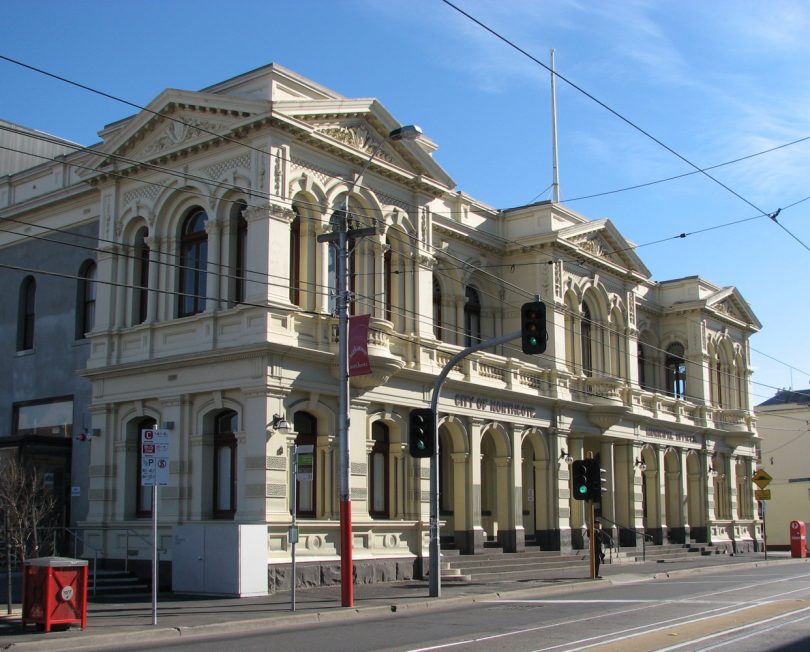The Preston Leader has serviced residents in Darebin’s north for over 130 years, providing local news to one of Melbourne’s most diverse councils.
But with dwindling resources at the paper and the cessation of its print edition this year, Darebin residents have been forced to turn to other sources for their local coverage.
The Preston Leader was printed as a local record of its parent the Northcote Leader as early as 1888, the two papers boasting the “largest circulation and best advertising medium in the northern suburbs” well into the 20th century.

An early 1888 edition of “The Northcote Leader and Preston Edition”. Credit: Darebin City Council
The close relationship between the two has endured, with reporter Richard Pearce covering both beats for Leader Community News.
Pearce said that as coverage at Melbourne’s metro dailies could be too broad, it was the Leader’s job to cover “news that people care about, that affects them personally and can change their life”.
“We need to fill those gaps and report on stories that other people don’t,” he said.
While local stories might briefly filter through the news cycle at the larger publications and broadcasters, Pearce said the Leader had the “flexibility to follow up” on events of local importance.
But readership and circulation of the paper has declined in recent years.
News Corp Australia, the parent company of Melbourne’s Leader newspapers, reported just 33,000 weekly readers of the Preston Leader in 2017, and locals have reported receiving the paper less and less since.
In April 2020, declining ad revenue and the economic effects of the coronavirus forced News Corp to stop printing the Preston and Northcote Leader entirely, alongside 58 other community titles.
Young Northcote local Hugh Morris-Dalton said while he missed the paper and its “local feel”, the content had been increasingly lacking.
“They occasionally had legitimate public interest stories up the front, but more and more it was just plugs for local businesses and activities,” he said.
Darebin councillor Steph Amir said because the “tone is consistent” across Leader newspapers, the Preston Leader could sometimes feel out of step with the community.

Darebin councillor Steph Amir found the Leader could be out of step with local views and values. Photo supplied
“[Darebin City Council]’s a very progressive area, arguably the most progressive council in Australia, which makes it interesting in the context of the Leader because it’s not necessarily presented in that frame,” she said.
Amir noted several characteristics of Darebin the Leader was prone to pass over, such as its multiculturalism, inclusivity of LGBTQI+ people and families and high concentration of artists.
“That in itself is not specific to Darebin but it’s definitely a big part of the culture and community, that makes us us,” she said.
But without a local newspaper, Darebin residents have lost crucial coverage of local council.
“The thing that’s really striking about council politics is that most of us can go most our lives without knowing anything about it,” Preston local Patrick Stokes said.
“But its impact on every aspect of day-to-day suburban life is a really important part of Australian democracy.”

Preston local Patrick Stokes: When we lose local papers, we lose “institutional memory of the granularity of local politics”. Photo supplied
Stokes, an Associate Professor of Philosophy at Deakin University and commentator on Darebin local politics, said most locals wouldn’t know “who the players are or what their agendas are” in the lead up to an election or a big council decision.
“Having people on the ground who know who’s who in the zoo is really important,” he said.
“And that’s one of the things we lose when, for instance, local newspapers disappear from the scene, is that sort of institutional memory of the granularity of local politics and who’s actually involved and what they’re trying to do.”
Reservoir local Serena O’Meley has tried to plug the gap in the community’s knowledge of council through a Facebook blog where she has posted a series of in-depth pieces, on council meetings and decisions, that she claimed would receive thousands of views.
O’Meley, an industrial officer for the National Tertiary Education Union, would attend meetings, comb through minutes and agendas, file FOI requests and unearth strategy and policy documents to craft stories on everything from development decisions to individual councillor misconduct.
In the lead up to the 2016 Darebin City Council election, she published a comprehensive guide to the 50-odd candidates standing for election and a series of ward-by-ward endorsements.
“People are extraordinarily ignorant of the people that they’re electing and it makes them absolutely victims of misrepresentation and lies in the public sphere,” O’Meley said.
“My goal is not publicity. My goal is to try and fix poor decision making and get more transparency in the way that we’re governed.”
While Amir and Stokes both indicated they saw her work as impartial, O’Meley disagreed: the developments she was reporting were ones that directly impacted her life.
But if you weren’t impartial, you had to be fair and accurate.
“I think it’s incredibly important that if you’re going to get involved in this kind of public citizen journalism you must be extremely accurate,” she said.
“It is time consuming but it’s also an investment in my community.”
While Stokes was full of praise for O’Meley’s work, he felt these “citizen journalists” could never replace the role of a local paper entirely.
“They don’t have the same kind of institutional heft or power and they don’t necessarily have the same kind of requirements for impartiality,” he said.
“In the same way that media outlets need a kind of critical scrutiny, then so too do citizen journalists.”

Preston City Oval. Darebin is one of Australia’s most multicultural and progressive city councils.
Amir said these new forms of local reporting were inaccessible to older demographics who couldn’t navigate the online space as easily as younger locals.
“The good thing about the Leader is the accessibility of print,” she said.
“If something is literally put on your doorstep, that’s pretty accessible.”
Pearce admitted the lack of a print edition and the paywall the Leader currently sat behind were major obstacles to the success of the local paper, but said the public needed to continue its support.
“We need to deliver the quality people want and allow them to access it easily,” he said.
And for the Leader or any other publication to speak for Darebin, it needed to ground itself in Darebin.
“I think we do forget that journalists are also part of the communities they report on, or ideally they should be,” Stokes said.
“And certainly I think in the case of local journalism, the people reporting on it, they’re also people who are potentially living with the decisions that are made.”







